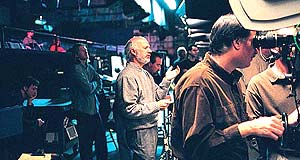He
knows what's funny, and he goes with his gut.
TV hit man James Burrows '62 is the reason America stays home
Thursday nights.
HIS DRESSING ROOM ISN'T ACTUALLY A ROOM. It's closer to
a closet. • But Jim Burrows doesn't dwell on the limits
of his surroundings. He views his environment instead with
a trademark brand of pragmatism.
"I
have the smallest dressing room, but it's the closest to
the stage," he says, putting his feet up on the coffee table
and digging a hand into the pocket of his corduroys.
Proximity
to the stage is but one ingredient in the 60-year-old director's
relentless focus on craft. His no-nonsense demeanor and
perfectionist drive suggest that, to the bearded Burrows,
television comedy is far more vocation than occupation.
As one of the creators of Cheers, and therefore a
millionaire dozens of times over, he certainly doesn't do
it for the paycheck.
 |
|
From
the sidelines Jim Burrows works his magic during a Tuesday
afternoon dress rehearsal of Will & Grace.
|
|
"I
get the work ethic from my father," he says, alluding to Abe
Burrows, the late Broadway writer-director known for How
to Succeed in Business without Really Trying and Guys
and Dolls. For more than half a century, directing has
been part of the Burrows DNA. For Jim Burrows--or Jimmy, as
most friends and co-workers call him--that deeply embedded
code has helped turn shows such as Taxi, Cheers, Friends,
Frasier, Caroline in the City, and Will & Grace
into mega-hits and earned him nine Emmy Awards. Former NBC
Entertainment President Warren Littlefield once said certain
programs became known as "Jimmy Shows." He joked that network
executives would eagerly mark pilots he was handling with
the letters "JS."
"As
my wife will tell you, I'm no good hanging around the house,"
Burrows says. "I could go play golf, I could go to the track,
I could go to Vegas. But I choose to come here, where I
have a good time."
By
"here," Burrows means the Los Angeles studio where Will
& Grace is about to close its third successful season.
The sun-drenched San Fernando Valley setting seems a long
way from overcast Oberlin, but the tight circles and sharp
intellect of his Hollywood milieu--not to mention the political
tinges of Will--often recall his college experience.
During an hour-long interview, it didn't take much prodding
to get the memories to tumble out--starting with the seed
planted by his famous father.
"I
would often meet all of my father's actor friends and
the literati and the cognoscenti," Burrows says. "He was
an intellectual who spoke with a mug-like voice--'der,
duh'--but he was very smart. He asked me what school I
wanted to go to, and I said Cornell, Brown, maybe NYU.
He did some investigation and found Oberlin.
"I
said, 'What's that school?' He said it was a small liberal-arts
school in the Midwest, co-educational. He was smart enough
to know that I grew up in the city and I should maybe
go away to college."
Not
long after, Abe Burrows put his son on an overnight train
from New York to Ohio. When Jim Burrows arrived, he found
a world that was invigorating, if a bit intimidating.
"I
was not a great student, but I fell in with a great bunch
of guys," Burrows remembers. "I learned how to live on
my own, which is what college is all about. It's learning
to live with other people. Oberlin is a great community."
With
a self-deprecating shake of the head, Burrows adds: "I
was a government major. I was going to be a math major,
but it just wasn't there. I was good in calculations,
but once I got into limits in calculus, I was dead."
Jon
Margolis '62, a friend who shared a four-person dorm room
with Burrows during their sophomore year, recalls Burrows'
greatest contribution to dorm culture.
"He
brought into our lives the first recording we'd ever heard
of Mel Brooks and Carl Reiner doing The 2000-Year-Old
Man. We still sprinkle bits from that into our conversation."
After
graduating in 1962 and earning a master's degree in theater
at Yale, Burrows worked as an assistant for his father
and started directing a bit in the theater. He had a nagging
sense, however, of not having found his true calling.
In
the early 1970s, he saw a new TV comedy starring Mary
Tyler Moore, whom he knew from one of his father's musicals.
Something clicked ("I said, 'Wow, they're doing a 20-minute
play every week'"), and he sent her a congratulatory letter.
Not long after, he was asked to work on Moore's show,
filmed, ironically, at the same studio lot where Burrows
now does Will & Grace.
Over
his career, especially the 11 years spent as executive
producer and director of Cheers, he has never stopped
sailing toward uncharted waters: different characters,
fresh wordplay, unexplored relationships.
Burrows
over the past decade has become a specialist in "pilots,"
or initial episodes of new series. It's an elite niche
among directors, many of whom gravitate toward steady,
predictable work on existing shows rather than seeking
to create new ones. In 1998, this quest for newness led
Burrows to Will & Grace.
go
to page | 1 | 2 | of Creating
a Scene
|

